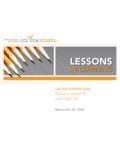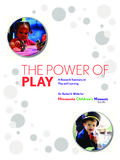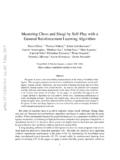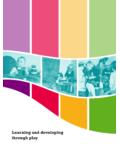Transcription of PlAy BASED lEARNING - Ascot Kindergarten
1 play BASED . lEARNING Written by Debbie Cole As adults we all have memories of childhood play , times when we could pursue our own interests, create adventures and explore new ideas. Our play was both planned and spontaneous, and utilised a vast range of natural, found, man-made and bought materials. Through these experiences we gained new skills, tested our abilities, formed friendships and became increasingly adept at navigating our way through the world. Children today are immersed in technology and popular outlines the many roles educators take in play and the Allows children to play for extended numeracy and the development of scientific concepts. As culture, and have increasing expectations placed on range of strategies they use to support lEARNING . These periods of time without interruption children are empowered to make decisions and initiate them regarding academic achievement.
2 This places include: Engaging in sustained shared conversations Allows children to extend their play and play , they become confident and motivated learners. greater pressure on care and education environments to within play experience to extend children's thinking projects for extended periods This in turn fosters responsibility and self regulation. play provide programs that focus on and maintain academic also provides children with many opportunities to resolve Providing a balance between child led, child Allows children to work alone or with others pursuits. However the importance of play as a vehicle conflict, challenge unfair play and embrace diversity. initiated and educator supported lEARNING Caters for different abilities and lEARNING styles for lEARNING cannot be underestimated. Early childhood Creating lEARNING environments to support lEARNING education has a long history of valuing play and this Connects experiences to children's lives What does play BASED lEARNING look like in practice?
3 Understanding is becoming more prevalent in primary Interacting with babies and children Links children's investigations to key The aim of the play BASED program is to promote a sense education. It is also emphasised in the new national within play to build attachment lEARNING areas or outcomes of wonder, exploration, investigation and interest in a rich and Victorian frameworks for early years education and Supporting the inclusion of all children in play Offers flexible routines that have minimal range of materials, resources and opportunities in which is being revitalised across many children's services. Recognising spontaneous teachable moments disruption to children's play the child can engage. (p. 30, Walker, 2007) The child is Promoting play BASED lEARNING requires adult to as they occur and using intentional teaching viewed as being instrumental to the way in which materials rethink their notions of play and develop programs strategies such as demonstrating, and engaging Benefits of play BASED lEARNING and equipment are selected and organised within the that integrate play and lEARNING into the curriculum.
4 In shared thinking and problem solving environment. Such environments are often described as child play provides the most natural and meaningful process focused as children are constantly engaged in meaningful Research shows that children are playing- lEARNING by which children can construct knowledge and individuals. In an open and tolerant atmosphere, where A play BASED program; understandings, practice skills, immerse themselves lEARNING experiences. While children's interests form the basis of the program, the environment needs to be carefully children are free to make their own choices, both play Incorporates children's ideas and interests naturally in a broad range of literacy and numeracy planned and presented in ways that are inviting to young and lEARNING dimensions will be present. Children do not into planned experiences and routines and engage in productive, intrinsically motivating children.
5 All experiences are BASED on supporting a balance separate play and lEARNING unless they are influenced U tilises children's ideas and interests to lEARNING environments. ( , Walker, 2007). of child and adult initiated ideas and investigations, and by adults.' ( Pramling Samuelsson, 2008) extend and create new experiences A play BASED program has many benefits for children as utilise the indoor and outdoor areas equally. Specific play Utilises indoor and outdoor areas to it facilitates the development of skills, dispositions and spaces or areas may be arranged to within the environment What is play BASED lEARNING ? facilitate play and lEARNING knowledge. As effective play BASED program can assist to engage children in different areas of lEARNING such as art, play BASED lEARNING draws from children's natural desire to O ffers a variety of play spaces, art, children to develop lifelong lEARNING skills that will stay with literacy and construction.
6 Within each area children should be engage in experiences BASED on their interests, strengths dramatic play , sensory, construction them beyond the early lEARNING environment. Engaging in offered a range of open-ended and loose materials that can and developing skills. When children initiate play , they are play BASED lEARNING enables children to use and develop be used across different abilities and diverse interests. This is O ffers a range of open-ended experiences and materials more motivated to learn and develop positive dispositions thinking skills such as problem solving, reasoning and particularly important for mixed age grouping however within towards lEARNING . The educator's role in supporting play Enables children to self select materials lateral thinking. It offers opportunities to interact with a single age group, it also enables children to explore their BASED lEARNING is vital.
7 Belonging Being and Becoming The and play independently others, develop communication strategies and work in interests using their individual strengths and skills. As these Early Years lEARNING Framework for Australia (2009:15) Enables children to transform play spaces collaboration with peers and adults. It can foster literacy, aspects can differ greatly between children, an effective play 19 20. A play BASED program does not limit or reduce the role of the adult in children's play . Although children are less likely to want adult intervention in their play as they become older, an interested adult can still play a critical role in enhancing children's play and lEARNING . BASED program actively supports and includes all children. and co-constructors of the lEARNING environment. be the sole purpose for the methods chosen to record educators working with children in the early years consistent The adult develops positive relationships with children and information.
8 More importantly, documentation should guidelines for practice. play BASED experiences provide rich A key element of the play BASED program is the opportunity families and uses their observations of children, information make children's play and lEARNING visible to the child, holistic opportunities for children's lEARNING across all the for children to pursue their interests for extended periods from families and colleagues, and meaningful interactions family and wider community. It should capture children's five lEARNING Outcomes in the EYLF. A single play scenario of time. Many programs for children rely heavily on with children to determine the curriculum. interests, skills and knowledge and highlight changes as may well provide opportunities for lEARNING in multiple or all themes, pre-planned activities and constant change.
9 As this knowledge changes, the program is also adapted children grow and develop. Children should be active lEARNING Outcomes at the same time. Regardless of how often children attend the program, to mirror children's changing interests and skills. contributors to individual and group documentation, The outcomes also enable educators to create lEARNING it is vital for play spaces and experiences to be offered and families should also be encouraged to share and environments that support children's lEARNING and provide over extended periods. This enables children to fully explore materials and master new skills through repeated The role of the adult in the play BASED program is to; exchange information with educators. Documentation consistent language for making children's lEARNING visible. Interact with and observe children to gain insights should enhance children's lEARNING and provide positive practice.
10 When guided by children, the educator will soon become aware when experiences and materials need to into their interests, skills and knowledge accounts of children's participation in the program. Conclusion be changed, extended or removed from the program. Be responsive to children's cues and the way The documentation used to assess children's lEARNING play is vital to children's wellbeing and sense of belonging, they use the environment and materials can take many forms, however the methods selected and forms the basis of who they become in the future. It is also important to consider aspects such as storage These elements form the vision of the national framework S eek information from families and colleagues to better needs to meet accountability requirements, reflect the and how children's play and lEARNING will be displayed and and should be reflected in a play BASED program.






